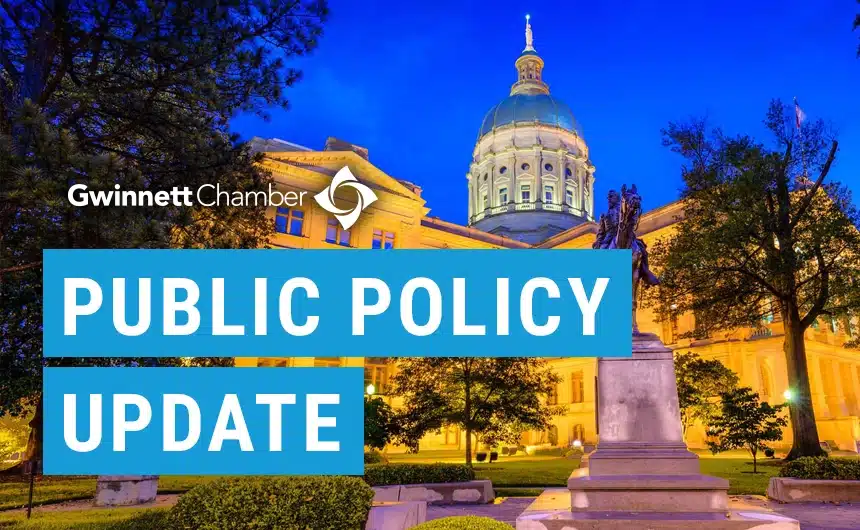Only 5 legislative days remain before the end of session after lawmakers completed days 33-35 this week. Committee and floor activity continues to increase as Sine Die approaches (March 28). Next week, the General Assembly will convene for legislative days 36-38.
House Minority Leader James Beverly (HD 143) announced last Friday that he will not run for reelection. With Senate Minority Leader Gloria Butler retiring after this year, democrats in the House and Senate will have new leadership next session.
Bills to Watch
HB 282 by State Representative Mesha Mainor (HD 56) would remove barriers for school districts to access and utilize soft skills career readiness curriculum training in their schools. The bill passed the House 165-0. It has been assigned to the Senate Education and Youth Committee.
HB 617 by Transportation Committee Chairman Rick Jasperse (HB 11) would allow GDOT to develop and maintain a state-wide freight and logistics implementation plan. The House unanimously passed the measure by substitute 168-0. It passed in the Senate Transportation Committee.
HB 926 by State Rep. Matt Reeves would allow an individual with a felony record to request a “certificate of good standing” from the Board of Corrections or the Board of Community Supervision for employers to consider in the hiring process. This bill, known as the Second Chance Workforce Act, would not hide criminal records but provide further context to an individual’s circumstances. It passed the House 159-1. It is under consideration in the Senate Judiciary Committee.
HB 946 sponsored by State Rep. Lee Hawkins (HD 27) would change the provisions for the calling of a T-SPLOST. Currently, all qualified cities within a county are required to enter into the intergovernmental agreement. This bill would allow cities representing more than 50% of the county municipal population to enter into an agreement. If all cities sign the agreement, the maximum amount of years levied may be extended to 6 years. The House bill passed 173-1. The Senate Finance Committee favorably reported.
HB 982 by State Representative Matthew Gambill (HD 15), one of Governor Kemp’s Floor Leaders, would require the State Workforce Development Board to publish a High-Demand Career List most critical to the state’s current and future workforce needs. The bill has been assigned to the Senate Higher Education Committee. The House passed the measure 161-1. The Senate passed the bill 53-1. It is headed to the Governor’s desk for consideration.
HB 1015 by State Rep. Lauren McDonald (HD 26) would reduce the state income tax from 5.57% to 5.39%, saving Georgia taxpayers roughly $1 billion. The bill has been assigned to the Senate Finance Committee. The House passed the bill unanimously. It was favorably reported in the Senate Finance Committee.
HB 1019 by State Rep. Matt Reeves (HD 99) would increase the Georgia homestead exemption from $2,000 to $4,000. The bill passed the House 162-0. The bill is assigned to the Senate Finance Committee.
HB 1023 by Majority Caucus Chairman Bruce Williamson (HD 112) would reduce the corporate tax rate to match the individual tax rate. The bill passed the House by substitute 138-28. It was favorably reported in the Senate Finance Committee.
HB 1033 by State Rep. Rob Leverett (HD 123) would add protections for utility workers, including subcontractors, by enhancing penalties for anyone threatening or injuring them. The House passed the bill unanimously 161-0. The Senate Judiciary Committee favorably reported by substitute.
HB 1114 by State Representative Will Wade (HD 9) directs the Insurance Commissioner’s office to collect and analyze anonymous data from insurers on tort related risks. The House passed the bill 132-32. The Senate Committee on Insurance and Labor favorably reported by substitute.
HB 1124 by State Representative Chuck Martin (HD 49) would change lower the credit requirements of students to be eligible for needs based financial aid. The House passed the bill 165-1. The Senate Higher Education Committee favorably reported.
HB 1172 by House Majority Caucus Whip James Burchett (HD 176) removes references to the public trust doctrine as it relates to water rights in SB 115 that passed in 2023. SB 542, the Senate’s version, was introduced this week. HB 1172 passed in the House 107-60. SB 542 passed the Senate 51-0.
HB 1180 by State Representative Kasey Carpenter (HD 4) would change the tax credit qualification requirements for film companies and add limits to the selling of credits. Rep. Carpenter is the Chairman of the House Creative Arts and Entertainment Committee. The House passed the bill by substitute 131-34. It is under consideration in the Senate Finance Committee.
HB 1181 by State Representative Chuck Martin (HD 49) would limit the carry-forward period for several tax credits and set a sunset date. The House passed the bill 166-0. The Senate passed the measure 45-2. The bill heads to the Governor’s desk.
HB 1192 by State Representative John Carson (HD 46) would suspend the issuance of new certificates of sales and use tax exemption on high-tech data center equipment. The House passed the bill 96-71. The Senate passed the bill 29-22. The bill heads to the Governor’s desk for his consideration.
HB 1371 by Majority Caucus Whip James Burchett would clarify liability regarding third-party criminal activity. It was introduced and first read in the House this week. The House unanimously passed the bill by substitute. It is in the Senate Judiciary Committee.
HB 1414 by State Representative Scott Hilton (HD 48) would create the City of Peachtree Corners Community Improvement District. Gwinnett currently has 6 CIDs. It passed both the House and Senate under local legislation.
SB 147 by State Senator Shawn Still (SD 147) is known as the “Boundless Opportunities for Georgia Students Act,” would allow student transfers from public school to public school under the condition that both the student and school agrees on transfer. The Senate passed the bill 38-14. SB 147 language was added to SB 233 by State Senator Greg Dolezal, which was the school voucher bill that did not pass in the House last session. The bill provides $6,500 per student for qualified education-related expenses. These funds would be for students attending the lowest performing public schools in Georgia. It also includes a provision that allows capital outlay funds to be used on Pre-K programs. The House passed the bill 92-82. The bill returns to the Senate for consideration.
SB 293 by State Senator Ben Watson (SD 1) would change the way county public health boards appoint district health directors. Currently, the county board of health appoints its director. This bill would have the state’s Public Health Commissioner appoint district health directors. Senate Health and Human Services Committee favorably reported by substitute. The Senate passed the bill 37-15. The House Committee on Public Health favorably reported by substitute.
SB 362 by State Senator Mike Hodges (SD 3) would require businesses to hold secret ballot elections for organizing unions in order to be eligible to receive certain tax incentives from the state. The bill passed in the Senate 31-23. The House Committee on Industry and Labor favorably reported.
SB 366 “Tax Expenditures Transparency Act of 2024” by State Senator Chuck Hufstetler (SD 52) would create the Joint Committee on Taxation and Economic Development to review the economic impact of tax credits and exemptions subject to analysis the prior year. The bill passed by substitute 50-0 in the Senate. The House Ways & Means Committee favorably reported by substitute.
SB 386 by State Senator Clint Dixon (SD 45) would put sports betting under the Georgia Lottery, avoiding the need to pass on a two thirds majority and constitutional amendment. State Senator Bill Cowsert (SD 46) proposed an amendment that would require a constitutional amendment. The Senate passed the measure with Cowsert’s amendment 35-15. The bill has been assigned to the House Higher Education Committee.
SB 420 by State Senator Jason Anavitarte (SD 31) would prohibit the acquisition of certain land by certain foreign persons and entities connected with foreign adversaries identified by the U.S. Secretary of Commerce. The Senate passed the bill 41-11. It has been assigned to the House Judiciary Committee.
SB 422 by State Senator Clint Dixon would increase the investment limit of an EMC in their natural gas affiliate from 15% to 25%. The bill is assigned to the Senate Regulated Industries and Utilities Committee. It passed in the Senate 51-1. It was favorably reported by substitute in the House Committee on Energy, Utilities & Telecommunications
SB 426 by State Senator Blake Tillery (SD 19) would limit how insurance companies can be sued in accidents with big trucks. The bill passed in the Senate 46-2. It was favorably considered by the House Judiciary Committee.
SB 429 by State Senator Greg Dolezal (SD 27) would allow lawmakers to evaluate pending legislation and rules that could impact small businesses. It also changes the definition of “small business” by raising the employee count from 100 to 300. The bill passed in the Senate 40-13. The bill is under consideration by the House Committee on Budget and Fiscal Affairs Oversight
SB 430 by State Senator Greg Dolezal would keep the COVID-19 liability protections in place for businesses but no longer require them to have a written warning of COVID-19 risk displayed. The Senate passed the bill unanimously 47-0. The House passed the bill 146-27.
SB 472 by State Senator John Albers (SD 56) is the “Combating Organized Retail Crime Act” and this bill will close the loophole of cash transactions on stolen goods. The Senate passed the bill unanimously 52-0. It was favorably reported in the House Committee on Agriculture & Consumer Affairs.





